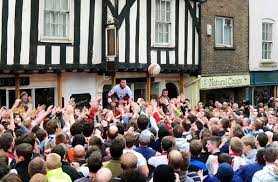Today (Tuesday 21 February) is Shrove Tuesday, the Christian festival that is celebrated in many countries around the world. It always falls on the Tuesday before the beginning of Lent on Ash Wednesday, the period of 40 days (Sundays are excluded) leading up to Easter, when traditionally Christians gave up all luxuries to remember, it is believed, when Jesus went into the desert for 40 days to fast and pray.
That practice has long since been abandoned by the vast majority, but many of the Shrove time traditions live on, as they still represent a good excuse to feast and play.
Never the same date for always the same reason
As Easter’s exact date varies considerably each year, dependant upon the moon, so therefore does Shove Tuesday’s date. Easter is always set for the first Sunday after the first full moon, following the vernal equinox. Shrovetide will always fall between February 3 and March 9.
Driven by a need to be “shriven”
The name Shrovetide is derived from the old word ‘shriving’, which had a meaning that effectively meant to listen to someone’s sins and more importantly, forgiving them. Back in old Anglo-Saxon England, Christians would go to church on Shrove Tuesday to confess all their many sins, and cleanse their soul. This became known as a process of being “shriven”.
Bells of confession
In many places the day expanded into a festival for fertility and spring, filled with indulgences in all manner of things. It remains however, popular in some Protestant and Roman Catholic Christian churches to continue the ritual of ringing the church bells, often referred to as ringing the Shriving Bell, supposedly to “call the faithful to confession before the solemn season of Lent.”
Various churches also burn the palms distributed during the previous year’s Palm Sunday Eucharistic liturgies, to make the ashes which will be used during the services held on the very next day, Ash Wednesday.
Mardi Gras
The day also goes by several other names including: in Germany “Fastnacht” meaning Eve of the Fast, and in France as well as several other parts of the world, “Mardi Gras”, coming from the French expression to mean Fat Tuesday. This very phrase for many people signifies one thing… party time. This is especially true in of the celebrations that take place in Rio de Janeiro, Venice, and New Orleans.
From Rio to New Orleans
The Brazilian version, as would be expected, embraces street parties, carnivals, colourful parades and elaborate fancy-dress costumes. It runs this year from 17-26 February.
In Venice their carnival began two weeks ago and ends on Fat Tuesday, or Martedi Grasso in Italian. Typical of Italy, masks are the main theme to their carnival, with stunning disguises to accompany striking masquerade costumes.
New Orleans however, go that little further with their celebrations, beginning their Mardi Gras on 6 January, the 12th day after Christmas, and closes with the arrival of Lent on Ash Wednesday.
Pancake day
In England, with people about to embark upon the Lenten fast, Shrove Tuesday was seen as the last opportunity to use up eggs and fats, with pancakes becoming an ideal way of using up these ingredients. A traditional English pancake is a thin, flat cake, made of batter and fried in a frying pan and served up immediately.
It has a very long history and featured in cookery books as far back as 1439. It is said with religious overtures that the full ingredients for pancakes can be seen to symbolise four points of significance at this time of year: eggs for creation; flour for the staff of life; salt for wholesomeness; and milk for its purity. However, those not overly religious simply just enjoy indulging on the tasty treats.
Pancake racing
Indeed, in the UK, Ireland, Australia, New Zealand and Canada, Shrove Tuesday is more familiarly known now as Pancake Day. They have become such a popular Shrove Tuesday tradition that on this day, it is estimated that a massive 52 million eggs are used in the UK alone.
The day in the UK now incorporates the pancake in much of its celebrations and fun activities, with pancake races taking place all across the country, that see people very often in ridiculous fancy dress costumes, race down local streets, tossing pancakes out of frying pans as they run.
Most famous race
The most famous pancake race still takes place at Olney, Buckinghamshire. Tradition will have everyone believe that back in 1445, a lady of the village heard the shriving bell while she was making pancakes and ran down to the church still in her apron, still clutching her frying pan and tossing it as she ran.
This Olney race is now famous the world over, but the only people allowed to compete have to be local housewives, and the dress code insists that they must wear an apron, and a hat or scarf.
School tradition
At Westminster School in London, something known as the annual Pancake Grease is held. A verger from nearby Westminster Abbey leads a procession of boys into the playground where upon the school cook tosses a huge pancake over a five-metre high bar, which is actual art in itself.
The boys then race to grab a portion of the pancake and the individual who ends up with the largest piece receives a financial reward from the Dean, originally an old guinea, or sovereign, probably now a 50 pence or pound coin; or in such an affluent area, maybe a Bitcoin!
Skip to it
In the seaside town of Scarborough, in North Yorkshire, the locals gather together on on the promenade to partake in a group skip. Long ropes are stretched across the road and the residents proceed, in groups of ten or more, to skip on the one rope. The customs origins are not known but it is thought to date way back to the Middle Ages.
Mob football all but died out
A tradition that used to be very popular in England dating right back to the 12th century, but one which died out in all but a few towns in the middle of the 19th century, was Shrove Tuesday football, essentially mob football
The passing of the 1835 Highways Act, which banned the playing of football on public highways, put a stop to the majority of the annual games, but several smaller towns survived the law, and have maintained the tradition. Alnwick in Northumberland, Atherstone in Warwickshire, Sedgefield in County Durham, and St Columb Major in Cornwall continue the practice to this day.
However, they cannot compete with what is recognised as THE Shrovetide football match, which takes place over the Tuesday and Wednesday each year in the glorious Derbyshire town of Ashbourne.
Royal seal of approval
Its official name is the Royal Ashbourne Shrovetide Football match, a title bestowed upon it during the reign of King George V. The Shrovetide committee took it upon themselves to send his daughter, Princess Mary, a special Shrovetide ball as a wedding gift, when she was married in 1922, on Shrove Tuesday. As a mark of gratitude from the Royal Family, the game was given the right to be called “Royal” Shrovetide Football.
Fire destroys records
The actual dates of the earliest games are sadly unknown, as records were lost in a devastating fire in the late eighteen hundreds; but it is known that the games were taking place definitely in the seventeenth century. Rivalry and sportsmanship are its fundamental requirements. The town is divided by the Henmore Brook, so traditionally, those born north of the river represent those called the Up’ards, and those born south of it are known as the Down’ards.
Local man “turns up”
The game is played over both Shrove Tuesday and Ash Wednesday, starting each day at 2pm, when an invited local man is given the honour of what has become known as “turning up” the ball from a plinth in a town centre car park, by the name of Shaw Croft. Ashbourne effectively shuts down for the two days, with shops boarded up and roads temporarily blocked off by marshals to keep traffic away from players.
Literally thousands of folk cram into the market town centre, and follow the action, which in all honesty, has very few rules. The goals are nearly three miles apart, located at former mills, and it pretty much takes the form of a revolving rugby scrum. Some players specialize in water play, spending much of their time in the river, whilst others excel when grappling away in the mass hug.
Goalscorer guaranteed to get wet
All the time, standing just outside the “scrum” are players, who are usually athletic, fast runners, waiting for the ball to become loose and get the opportunity to race clear of the pack, all the way to their target. Once there, they have to jump into the river and hit the ball against a mill stone, mounted in a plinth, three times. If a goal is “scored” before 6pm, then a new ball is released and play restarts until 10pm, any goal scored after 6pm results in the game ending for the day.
Pride in keeping the ball
The balls are specially hand-made ahead of the game by local craftsmen, whose skills have been handed down through many generations, and then hand-painted by two local artists to reflect the lives and interests of the turners-up.
They are much larger than a standard football, and are filled with cork to help them float for their frequent journey’s through water over the course of the two days. Anybody who scores a goal gets to keep their ball, which is as good as it gets for a local.
Ashbourne captures true spirit of Shrovetide
This game possibly more than any other, captures the true spirit of Shrovetide. An astonishing spectacle, amazing atmosphere, communities coming together to play hard, but also share in the incredible camaraderie and friendship, and in Ashbourne barely a pancake to be seen.







0 Comments